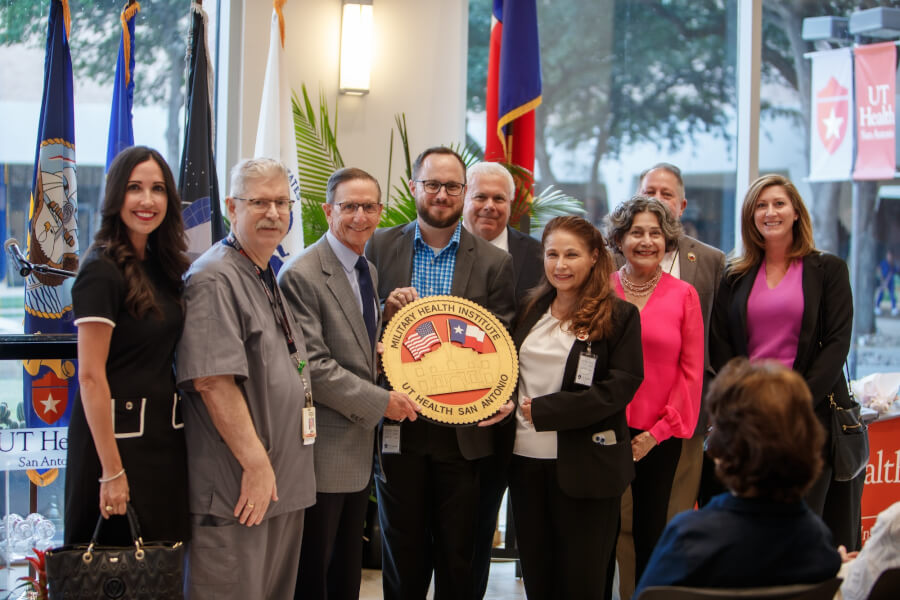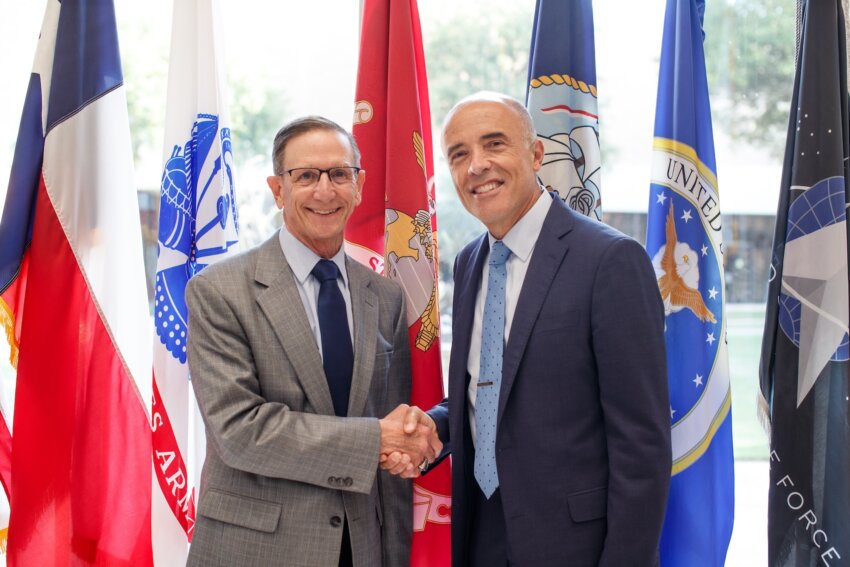Welcoming new MHI executive director
After 10 years of distinguished leadership at the Military Health Institute (MHI) at UT Health San Antonio, founding director Byron C. Hepburn, MD, FAAFP, Maj. Gen., United States Air Force, Ret., will retire happy in knowing that the institute will be in excellent hands when Robert I. Miller, MD, MBA, MSS, FAAP, FACHE, FACPE, Lt. Gen., United States Air Force, Ret., takes the helm as executive director on Oct. 15.
“Dr. Miller will be a great asset as the university transitions with the blending of UTSA and UT Health San Antonio,” Hepburn said. “He’s led large organizations that are complex, so I think he’ll definitely be a great team player in that process as we move forward over the next several years.”
As Hepburn sets to depart on Sept. 30, he looks upon his valued time at the MHI with pride and continued optimism for the future he helped set in motion.

Building enduring relationships
Under Hepburn’s decade of leadership, the institute expanded and fortified its relationships with the university and with local and government partners — helping to shine a light on the importance of military health.
Among the consortiums formed during his tenure was the Trauma Research and Combat Casualty Care Collaborative, or TRC4 — a collaborative created to address a critical need for improved trauma care on the battlefield and in the civilian sector.
The 38-year military veteran also helped establish the Human Optimization Partnership to conduct military health research focused on improving the performance outcomes of the nation’s service members and veterans.
Hepburn also served as a clinical professor in the Department of Family and Community Medicine’s Family Medicine Residency Program, helping to nurture future generations of health professionals.
“UT Health San Antonio is grateful to Dr. Hepburn for the Military Health Institute’s many achievements during his distinguished tenure,” said Acting President of UT Health San Antonio Robert Hromas. “His leadership has been instrumental in expanding the valued collaborations between UT Health San Antonio, the Department of Defense and the Department of Veterans Affairs. His mentorship of the next generation of health professionals has been invaluable. We thank him for his unwavering dedication to enhancing research, education and clinical advocacy to benefit the health of military personnel and our community and wish him the very best as he ventures into an exciting new chapter in his life.”
A vision for military health
As one of only 15 U.S. Air Force pilot-physicians with extensive experience in the air evacuations of casualties throughout the world, Hepburn was the perfect candidate to helm the MHI when it launched in 2014.
He was serving as commander of the 59th Medical Wing and Wilford Hall Ambulatory Surgical Center, Joint Base San Antonio-Lackland, when he became good friends with then UT Health San Antonio President William L. Henrich, MD, MACP, and appointed him as the honorary commander of the 59th Medical Wing.
“He approached me and said,” Byron, we would love to get this institute established and we feel you’re the right person for that position,’” Hepburn recalled.
Thanks to the vision of Henrich and then USAA CEO Maj. Gen. Ret., Josue (Joe) Robles Jr., the institute was launched with the mission to improve the health and resiliency of the nation’s military service members, veterans and their families through research, education and patient care.
“In 2014 we in San Antonio were … taking care of a number of casualties from Afghanistan and Iraq and [Dr. Henrich and Maj. Gen. Robles] felt very strongly that we could take the university’s commitment to the military, veterans and their families, to the next level of excellence,” Hepburn said. “That was the genesis of this institute, with a very generous grant by USAA.”
Over the past decade, the institute has flourished with Hepburn paving the way for community engagement and support for important research-related grants.
“The beauty of military health-related research is that it has applicability to humanity,” Hepburn said.
A new beginning
During his retirement, Hepburn will continue to chair the San Antonio Medical Foundation and will remain very engaged with the university, he said, adding that Robert Miller will be a great addition to the MHI.
“I’ve known Dr. Miller since he was a medical student,” Hepburn said. “He is just outstanding. … I am confident that he’ll take the MHI to the next level of excellence. He is sure to see new opportunities and move us forward.”
Miller has more than 30 years of service in the United States Air Force, where he held several top leadership roles. Most recently, he retired as surgeon general of the United States Air Force and Space Force. Throughout his distinguished career, he served as a command surgeon, director of education and training and director of medical operations.
In his role as executive director, Miller will oversee the institute’s support to research programs in military health, partnerships with local, state and federal organizations, and the development of new initiatives that advance military medicine and support the military community.
Hepburn, whose wife Debby Hepburn recently served as the chair of the School of Nursing’s, Nursing Advisory Council, said that he and his wife loved their time at the university.
“We’ll continue to champion the university,” he said, adding that they look forward to traveling, visiting with family and friends and engaging in community activities.


